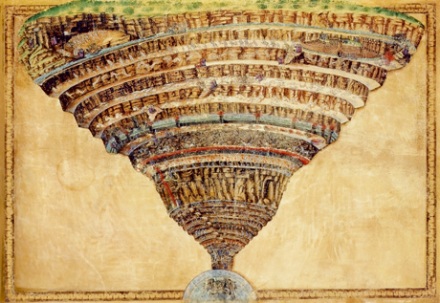An Islamic Prophetic tradition (hadith):
“It was narrated that Abu Sa’eed al-Khudri said: ‘We (the believers) said, ‘O Messenger of Allah, will we see our Lord on the Day of Resurrection?’ He (Prophet Muhammad) said, ‘Do you have any difficulty in seeing the sun and the moon when the sky is clear?’ We said, ‘No.’ He said, ‘So you will have no difficulty in seeing your Lord on that Day, just as you have no difficulty in seeing the sun and the moon (in a clear sky).
…Then the bridge (sirat) will be laid across Hell.’ We said, ‘O Messenger of Allah! What is the bridge?’ He said, ‘It is a slippery (bridge) on which there are clamps and (hooks like) thorns which are wide at one side and narrow at the other and have bent ends. A plant with such thorns is found in Najd and is called al-Sa’daan. Some of the believers will cross the bridge as quickly as the wink of an eye, some others as quick as lightning, a strong wind, or fast horses or she-camels. So some will be safe without any harm; some will be safe after receiving some scratches, and some will fall down into Hell (Fire). The last person will cross by being dragged (over the bridge). You cannot be more pressing in claiming from me a right that has been clearly proved to be yours than the believers in interceding with Almighty Allaah for their brothers on that Day, when they see themselves safe. ‘They will say, ‘O Lord, our brothers used to pray with us and fast with us and do good deeds with us.’ Allah will say, ‘Go, and whoever you find with a dinar’s-weight of faith in his heart, bring him forth, and Allah will forbid their bodies to the Fire.’ So they will go, and some of them will be sinking into the Fire up to their feet or shins, and they will bring forth those whom they recognize. Then they will come back, and He will say, ‘Go, and whoever you find with half a dinar’s-weight of faith in his heart, bring him forth.’ So they will go and bring forth those whom they recognize. Then they will come back, and He will say, ‘Go, and whoever you find with an atom’s-weight of faith in his heart, bring him forth.’ So they will go and bring forth those whom they recognize.’ Abu Sa’eed said: ‘If you do not believe me, then read the verse interpretation of the meaning:
Surely, Allah wrongs not even of the weight of an atom (or a small ant), but if there is any good (done), He doubles it, and gives from Him a great reward [Qur’an, 4:40].
[The Prophet (peace be upon him) said:] ‘So the Prophets, the angels and the believers will intercede, and the Compellor (Allah) will say, ‘There remains My intercession.’ Then He will take a handful from the Fire and bring forth some people whose bodies have been burnt and throw them into a river at the entrance to Paradise that is called the Water of Life.
They will grow on its banks, as a seed carried by a flood grows. You have seen how it grows beside a rock or beside a tree, and how the side facing the sun is usually green while the side facing the shade is white. They will come out like pearls, and necklaces will be placed around their necks. Then they will enter Paradise, and the people of Paradise will say, ‘These are the people emancipated by the Most Merciful. He has admitted them into Paradise without them having done any good deeds and without them having sent forth any good (for themselves).’ Then it will be said to them, ‘You will have what you have seen and the equivalent thereof.'”
(Narrated by al-Bukhari in Kitab al-Tawheed (The Book of Unity), no. 7440)
Al-Jabbar (the Compellor)
“He is the repairer of the broken, the completer of the lacking, the one who can enforce His will without any opposition.
Hadrat Ali used to pray, Ya Jabbira kulli kasirum wa ya masahilla kulli ‘asirin—’O Jabbar (the Compellor), who puts together all that is broken and brings ease to every difficulty.’
At the same time al-Jabbar is the one who is able to enforce His will at all times and places without any opposition. This forcefulness makes submission a necessity. His forcefulness is within the destiny of all His creation. The sun cannot say, ‘I will not rise again.’ The wind cannot say, ‘I will not blow again.’ Yet the human being is given a choice. We are also given the wisdom to know what is right and what is wrong. We are given freedom yet the purpose of our creation is to know Allah, to find Allah, and to become the servant of Allah. But this is not enforced on us. Allah has left it to our wish.
We find al-Jabbar by knowing that the only place to go to repair our broken hopes, to find peace in the confusion in which we find ourselves, is to Allah. On those unhappy occasions of disobedience and revolt, if we run to take refuge in Allah’s mercy before the coming of His punishment (from which no force can save us and from which there is nowhere to hide), we will find in this moment the recollection of Allah in His capacity as the Forceful One.”
Source: Shaykh Tosun Bayrak al-Jerrahi al-Halveti, The Name & the Named: The Attributes of God, pp. 61-2

